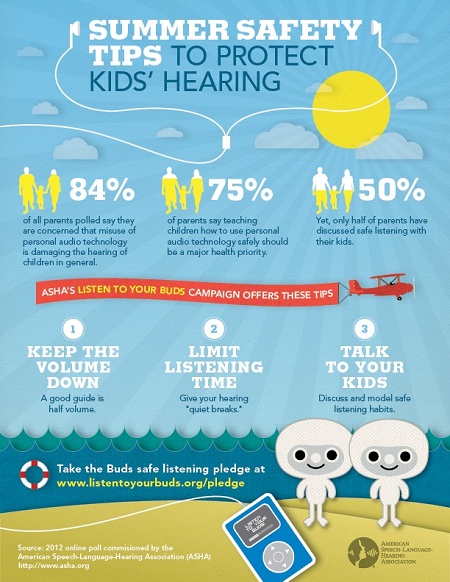Rockville, MD - June 20, 2012 - As school lets out and summer vacation begins, many kids will grab their headphones to tune into personal audio technology devices to pass the time. Whether hitting the road on family vacations or enjoying the relaxed schedule of school-free days, families can make safe listening a priority this summer.
Frequent listening to headphones at high volumes for extended periods of time can result in lifelong hearing loss. The loss may occur painlessly and gradually, often going unnoticed until it is too late. Even minimal hearing loss can affect social interaction, communication skills, behavior, emotional development, and academic performance. Children are using media for hours daily, studies and surveys repeatedly report, and kids who don't know how to use personal audio technology safely may harm their hearing.
An online poll commissioned by the American Speech-Language-Hearing Association (ASHA) indicates that parents are concerned about potential hearing loss:
- 84% of all parents polled say they are concerned that misuse of personal audio technology is damaging the hearing of children in general.
- 75% of parents say teaching children how to use personal audio technology safely should be a major health priority.
- Yet, only half of parents have discussed safe listening with their kids.
- Keep the volume down. A good guideline is half volume.
- Limit listening time. Give your hearing "quiet breaks."
- Model good listening habits for your children.
- Take the Buds safe listening pledge at www.listentoyourbuds.org/pledge/.
Complete poll results at: www.listentoyourbuds.org/ASHA-Poll/.

About the American Speech-Language-Hearing Association
ASHA, www.asha.org, is the national professional, scientific, and credentialing association for more than 150,000 audiologists, speech-language pathologists, and speech, language, and hearing scientists in the United States and internationally. Audiologists specialize in preventing and assessing hearing and balance disorders as well as providing audiologic treatment including hearing aids. Speech-language pathologists identify, assess, and treat speech and language problems including swallowing disorders.

